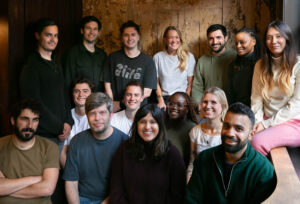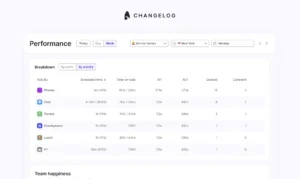
Engineering Culture at Surfboard

Written by Matt Schofield, ex-CTO Surfboard
At Surfboard, we’re on a mission to create happy teams and happy customers. One of the UN development goals is productive employment and decent work for all, and many companies fall short of that. According to the Financial Times, 40% of shift workers in the UK do not know what their next week’s shift pattern is going to look like. This is a result of not having the right planning tools in place, with most teams organising their teams using either spreadsheets or legacy software. We’re going to fix this by providing them with the tools to manage their teams in a way that’s fit for the modern world.
We’ve started by focusing on customer service teams because it’s where we see the most immediate opportunity for us to fix things. My own experiences working in customer service are limited to working at Morrison’s in my early teens but, even from that, I know how gruelling, mostly thankless and demoralising that kind of work can be.
Customer service is complex. The requirement to manage different inbound channels (phone, web chat, email, social media) and respond to customers speedily whilst running multiple tasks beyond just answering questions (such as following up on orders or fixing accounts) means there are always plates spinning and there is a huge amount of context-switching.
The complexity of the job and not knowing whether your day is going to be made pleasant or deeply unpleasant by a customer is a huge source of anxiety in customer service staff. Combine that with the uncertainty of the past year or so (Will you even have a job next week? Will there even be an employer next week?) and the feelings compound. Now imagine that you have all of that, plus you can’t even plan your life over the next week! How do you sort out childcare, attend classes or care for relatives if you don’t know when you’re going to be working?
This struck me as a kind of injustice, a kind of leaving behind of those who might not yet benefit from the privileges offered to those who work in technology (or any other creative industry) where an individual’s output is a function of their wellbeing. For this reason, I wanted to join Surfboard and do something about it.
What do we mean by culture?
You may also get the impression from some who work in start-ups that culture is somehow something you get in return for work. (Hence the old adage that culture isn’t built overnight – it takes at least a week for the ping-pong table to arrive.) This is fundamentally incorrect. Perks are not culture. A company may have phenomenal perks but that doesn’t mean it will be a fulfilling place to work.
Culture is the way we work. It is embodied attitudes and examples set by those who’ve brought the company to wherever it is. It’s how a company communicates and how it handles ups and downs. It’s how performance is managed, how hiring happens and how the company talks about itself.
The culture at Surfboard
It can be difficult to find words to describe a company’s culture as it is not always consciously created. However, from our experience in start-ups and from conversations we’ve had with each other about the culture we want to create, we think our culture has four key tenets:
- Focus As a young company, we can’t afford to try and fix all problems at once. We have lots of ideas but practise discipline in deciding which problems to focus on now and which ones can be tackled later. This means that a frequent question in our engineering discussions is “is this important right now?“. We like to focus on the problems that will deliver value to our customers in the shortest possible time, whilst keeping an eye on the moonshots that would Change Everything in the future.
- Empathy We love to listen, both to our clients and to each other. Without it, we don’t learn anything. This means we care about each others’ perspectives and appreciate the value that each of us brings to the team. We acknowledge that no-one can do this alone and that we all have complementary skills as well as strengths and weaknesses. This is normal. We practise honesty, care and transparency in our communication because we care about raising each other up. Our Product culture is, appropriately, underpinned by listening to what our customers have to say and understanding the way they think. We’ve already learned so much about how our customers operate and we plan to continue this so we can deliver the best experience possible to them.
- Experimentation One of our company values is failing equals learning. This means we’re open to building new things even if they don’t work out – whether that’s trying out a new programming language or framework, or building a new service to improve an internal process. We like to take risks even if they don’t pay off. We fail and learn. We celebrate learning things even if the lesson was learned the hard way. We’re humble enough to acknowledge that we may not know things. We like to make decisions based on evidence and data, testing our hypotheses early to de-risk as much of our work as we can.
- Excellence Most importantly, we want to create a product our customers love and that is unmatched in quality, that will speak for itself and facilitate a radical shift in the way customer service teams operate. We want to always be improving and celebrating that improvement with each other. We use the best tools and technologies for the job and take the time to build things right. Right now for engineering, this means we’re investing in the foundations of our platform, making it easy to change our infrastructure and quick to deploy updates to our product. We’ve CI/CD built-in from the start and we’re using Google Cloud Platform to keep our cloud overheads low (both in cost and complexity). Our stack comprises Terraform, Go and Python right now but we’re also thinking about incorporating more functional programming techniques into the way our applications work.
We know that we’re only just getting started and that our culture will evolve over time but we believe it is what will make us as a company. If you’re interested in culture and want to help shape ours, we’re hiring engineers now and I would love to hear from you.



